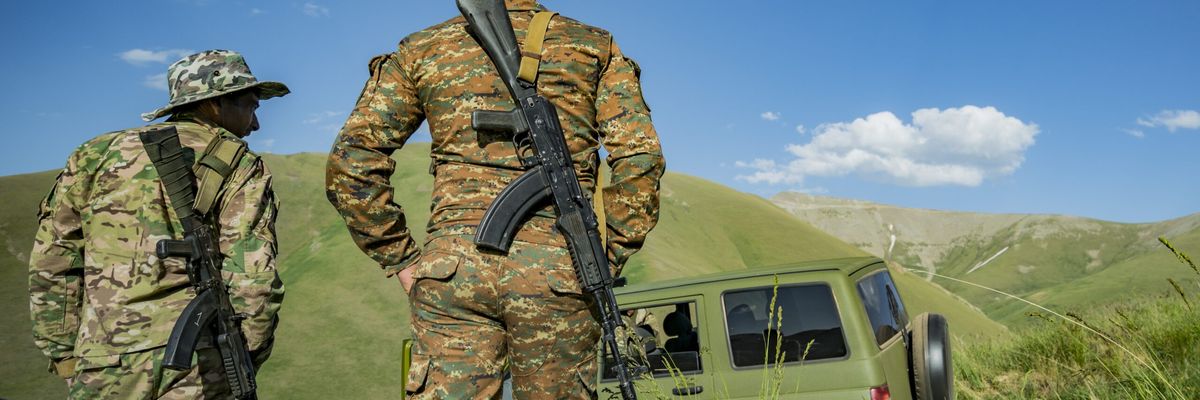The latest clash between Azeri and Armenian forces in the disputed territory of Nagorno-Karabakh highlights the acute danger that the war in Ukraine will reignite other frozen and semi-frozen conflicts in Europe.
The United States and the West should do everything possible diplomatically to make sure that this does not happen. Apart from the human suffering involved, the results of new conflicts could in some cases be very unfavorable to the West.
The struggle over Nagorno-Karabakh — a largely Armenian enclave within Azerbaijan — began in the late 1980s, as the Soviet Union approached dissolution. For three years it was contained by Soviet troops, but with the end of the USSR it burst into a full-scale war, which Armenia won, with considerable help from the Armenian diaspora in the West. The resulting ceasefire mostly held from 1995 to 2020, when Azerbaijan — armed by Turkey and supported by plentiful energy revenues — launched an offensive that reconquered much of the territory held by Armenia.
The 2020 war was ended by a ceasefire brokered by Russia, and enforced by around 2,000 Russian peacekeeping troops. Armenia itself has a defense agreement with Russia, and Moscow maintains a military presence there. This agreement however does not extend to Nagorno-Karabakh, whose independence Russia does not recognize. Armenians regard the Russian alliance as crucial to ensuring that Turkey does not intervene directly in the Karabakh conflict on the side of the Azeris, with whom the Turks share a strong ethnic affinity.
Iran too has a stake in the Karabakh conflict. Tehran wants a continued Russian presence in the southern Caucasus to prevent NATO expansion to the region. It fears that Georgia and Azerbaijan might host U.S. military bases to threaten Iran, and that Azerbaijan might receive U.S. support to stir up separatism in Iranian Azerbaijan (the present Republic of Azerbaijan was part of Iran until conquered by Russia in the early 19th Century).
So far, Azerbaijan has held aloof from the war in Ukraine. It has provided humanitarian aid to Ukraine, but abstained from the UN General Assembly vote that condemned Russia’s invasion, and has refused to participate in Western sanctions against Russia. However, with the Russian armed forces bogged down in Ukraine, an obvious temptation exists for Azerbaijan to disregard the Russian peacekeeping force and launch a new offensive with the aim of total victory in Nagorno-Karabakh. The latest clash was preceded by a series of moves by Azerbaijan to put increased pressure on Nagorno-Karabakh.
This temptation also exists in Georgia. As with Nagorno-Karabakh, the ethnic minority territories of Abkhazia and South Ossetia broke away from Georgia during the Soviet collapse, and were placed under the protection of Russian troops. A Georgian attempt to recover South Ossetia by force in 2008 resulted in crushing defeat by the Russian army. Once again, the war in Ukraine might seem to give Georgia the chance to redress this defeat and recover its lost territories.
Any such plans on the part of Georgians and Azeris should be strongly discouraged by the West. The Russian armed forces have fared poorly in Ukraine, but Russia remains vastly more powerful than Georgia and Azerbaijan. A war between Russia and Azerbaijan would bring with it the risk of Turkish and Iranian intervention and a general regional conflict.
In the case of Georgia, a fresh Georgian defeat at the hands of Russia would face the United States and NATO with a choice between humiliation, if they failed to intervene to help a partner, and the risk of direct war with Russia if they did intervene.
In the case of relations between Armenia and Azerbaijan, the European Union, in the person of European Council president Charles Michel, is acting as a mediator in an effort to reduce tensions and restore transport links. So far however, no progress at all appears to have been made on the central issue of Karabakh. In a very significant concession, the government of Armenia has made a gesture towards recognition of Azerbaijan’s territorial integrity; but Azerbaijan for its part has declared that Nagorno-Karabakh no longer exists as a territorial entity, which hardly suggests a willingness to compromise. Nor has the EU or any Western government suggested a willingness to send its own peacekeepers to the Caucasus to replace those of Russia.
Nonetheless, the West should go on working to try to resolve these conflicts, while doing its utmost diplomatically to prevent their escalation. Condemnation of Russia’s role in the southern Caucasus is easy. Replacing that role would be extremely hard. And bad though the existing situation is, absent wisdom and restraint it could easily get much worse for everyone involved.
















